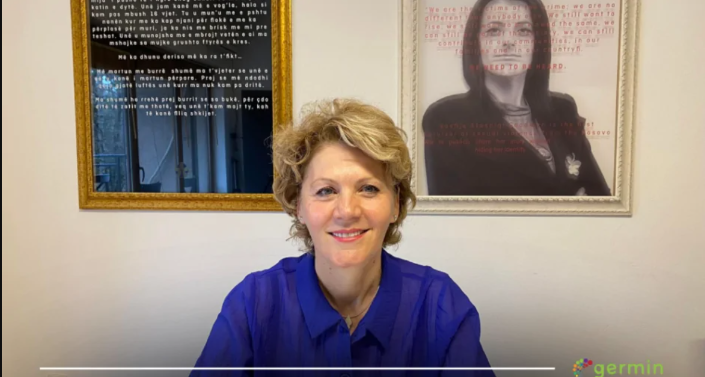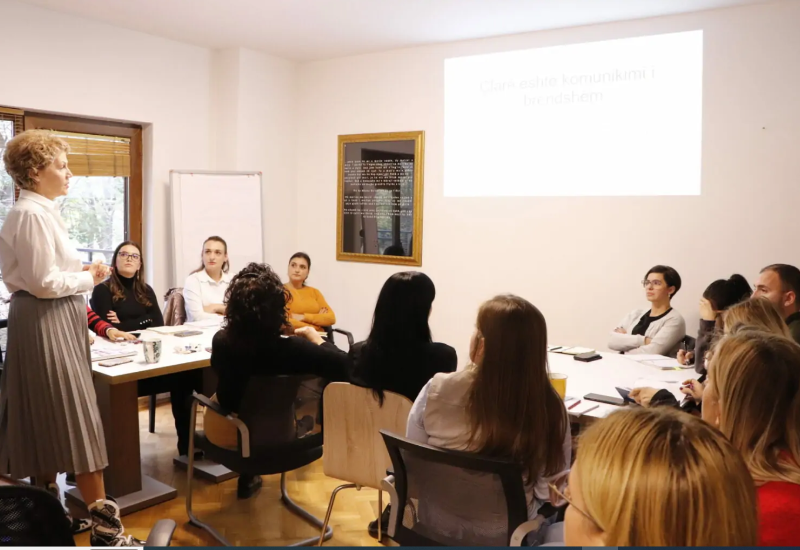How did Atifete Xhemaj’s 20-year career in Belgium begin?
In 1998, Atifete Xhemaj left Kosovo. Due to the conditions of stay that Belgium offered, she and her family stayed there. Not only did Atifete leave behind her family and hometown but also her entire professional baggage.
Professional experience gained in Kosovo was not applicable in Belgium. She had to start from scratch. Atifete began by learning the language, and at the same time, she started doing activities that would help her in communication.
“My first experiences began there, I had to start from scratch,” Xhemaj says.
Because of her ability to communicate with others, Atifete quickly advanced as a sales trainer and staff coach in various trade sectors.
“At first, I didn’t understand the term “coach,” but it soon became clear that I possessed it as a natural talent.”
She has worked as a trainer and coach for various teams for over 20 years to improve mutual communication among team members and thus achieve better results.
Contribution to Kosovo
What an experience! For years, she has been looking for ways to invest her skills in the Kosovo economy. So, when she came across the opportunity offered by GERMIN within the USAID Civic Engagement Program for diaspora experts to contribute to the capacity building of non-governmental organizations in Kosovo, she applied right away.
This is how Xhemaj began her volunteer work at The Kosova Rehabilitation Center for Torture Victims (KRCT) from October to December 2022.
The KRCT has a sensitive and specific scope, but according to Xhemaj the way the issue of torture is being handled by the staff is “commendable.”
“There are psychologists and lawyers here. They know exactly which points to touch and how to trust each other, which has helped me gain a lot of knowledge about the history and experiences of our people”.
Xhemaj’s primary responsibility at the KRCT was to support the organization’s communication strategy in general, as well as the PR officer, Mrs. Rrezarta Isma.
“We created a poster that visually represents the KRCT’s work. This poster was to be presented at the “Si të shërohemi? Nga zemra te arti” conference, held in London. We also made some videos, which I believe should be posted on the KRCT’s social media channels on a daily basis.
In addition to communication outside the organization, Xhemaj has also contributed to promoting internal communication at KRCT.
“We have organized several seminars with different topics with a focus: “A simple strategy of internal communication of the organization.”
Rrezarta Isma, who had the opportunity to work closely with Mrs. Xhemaj, also appreciates the workshops that the expert from Belgium conducted with the organization’s internal employees.
She stated that Xhemaj has helped their organization to communicate with the public about the work that they do. They are happy to have applied for GERMIN’s open call, hoping to find a mentor with whom they can develop good communication with the public and staff within the organization.
“We were fortunate to have Atifete Xhemaj as an expert because not everyone would understand the sensitivity of the work and our needs. She has baggage, a wealth of different experiences gained outside of Kosovo, but she has not forgotten her Kosovar roots, which is why she understands the context in which we work”.
Isma further added: “Atifetja has given us the opportunity, both in terms of time and in terms of communication style. To regularly sit together and get to know each other and thus communicate better with each other. Internal communication is the starting point in creating the strategy for external communication with the public.”
According to Isma, the results of her efforts as an expert in the KRCT will become visible in the future as well.
“We came up with a complete campaign together, thanks to her direct commitment. It is the campaign ‘Together against violence, we demand justice’ for the 16 days of activism against violence against women. But, more importantly, it has planted a seed within our NGO that will grow organically.”

Germin contributes directly to the promotion of the diversity of resources for the civil society sector through the civic engagement program, specifically the engagement of diaspora experts, where in addition to financial resources, the approach will also affect the voluntary resources of diaspora professionals. The Kosovo Civic Engagement Program is a five-year program implemented by the Kosovo Civil Society Foundation (KCSF) in partnership with the United States Agency for International Development (USAID).
This story is made possible by the generous support of the American people through the United States Agency for International Development (USAID). The contents are the responsibility of Germin and do not necessarily reflect the views of USAID or the United States Government.


Leave a comment